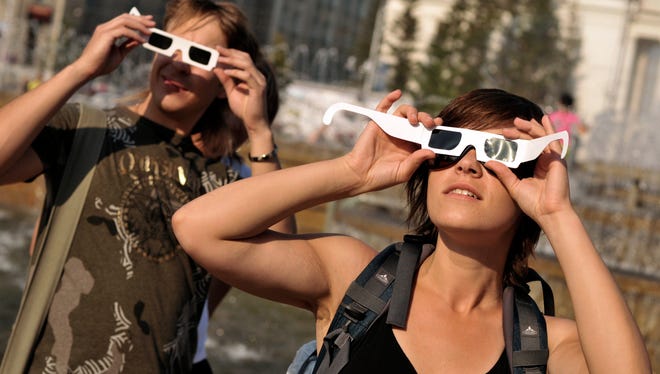Coast-to-coast ka-ching! Eclipse tourism bringing in millions from Oregon to S.C.
 Doyle Rice
Doyle Rice
Call it coast-to-coast ka-ching!
Just 2-3 minutes of darkness during the Aug. 21 total solar eclipse is bringing in millions of tourist dollars from Oregon to South Carolina as hotels, campgrounds, restaurants and museums enjoy a phenomenal boon to business.
Nashville, the largest U.S. city entirely in the path of the total eclipse, estimates 50,000-75,000 visitors will stay overnight and spend a total of $15 to $20 million, said Heather Middleton of the city's tourism board, VisitMusicCity.com.
"Since this is an event that's never happened before, it's difficult to know exactly," she added.

More than 100,000 people are expected to visit Salem, Ore., the first big city that will see the eclipse, Kara Kuh of TravelSalem.com said. That almost doubles the town's population for the day.
"We can definitely say that restaurants, gas stations, grocery stores and other retail shops are going to be extremely busy in the days leading up to and just after the event," she said.
More:Solar eclipse fever will transform this quiet Ky. town on Aug. 21
More:Solar eclipse by zip code: Find out if you live in the path
More:Solar eclipse lodging still available in several states, but act fast!
Hotels are about 95% full, and campgrounds in state parks are fully booked, Kuh said. The estimated economic impact from the event: $9 million, she said.
Southeastern Idaho could see anywhere from 300,000 to 500,000 people for the eclipse, said Kerry Hammon, spokeswoman for the city of Idaho Falls, population 60,000. She said all hotel rooms in the area are booked "for very high prices."
City parks as well as farmers' fields in the area will become makeshift camping areas for RVs and tents, Hammon said.
Farther inland, in Casper, Wyo., the city with the best chance of clear skies of any location in the path of the eclipse, about 35,000 people should be in town for the event, said Anne Wilcox of EclipseCasper.com.

"Our hotels and campgrounds saw reservations as long as three years ago and have maintained a nearly sold-out status since August of last year," she said.
Anywhere from 50,000 to 500,000 visitors are expected in St. Joseph, Mo., over the weekend and the day of the eclipse, said Beth Carmichael of the city's tourism bureau. The town's population is 76,000.
"Not only are our hotels sold out, but as residents we have a lot of friends and family coming in for the eclipse," she said. "I have six out-of-town relatives coming, and I’ve heard as many as 20 people coming to stay in some houses here in town."
In St. Louis, only southern parts of the metro area will see the total eclipse. Still, Anthony Paraino, director of communications for Explore St. Louis, said the city is expecting thousands of visitors.
"We've had a spike in hotel bookings" for both Aug. 20 and Aug. 21, he said. Thousands of hotel rooms are still available for this "once-in-a-lifetime" experience, he added.
The total eclipse is only 20 minutes from the downtown area, so Paraino urges visitors to "come to St. Louis and drive a bit further south."
Finally, in South Carolina, the last state to see the eclipse, NASA predicts 1 million visitors to the state overall. And Airbnb reported Aug. 20 will be its biggest night in South Carolina ever.
Both the state capital of Columbia and its most populous city, Charleston, are ready for the big day.
More:Do you have your solar eclipse glasses?
More:'Eclipse blindness' is a real thing. How to know which solar eclipse glasses are safe.
More:School's out for the eclipse: Why class is canceled for many in the South on Aug. 21
In Columbia, almost all of the area's 11,600 hotel rooms are booked, according to Andrea Mensink of ExperienceColumbiaSC.com. In all, she said there will be over 120 eclipse events happening across the region. Total estimated attendance is more than 166,000 combined, she said.
The eclipse has also caused a spike in stories about Columbia, S.C. About 250 regional, national and international pieces have been written this year, far above the annual average of about 95 stories, Mensink said.
"For our region, this is phenomenal," she added.
Restaurants normally closed Sunday and Monday are opening to welcome eclipse guests, Mensink said.
The South Carolina State Museum conservatively estimates it will generate $235,000 from eclipse-related activities, said Merritt M. McNeely, director of marketing for the museum. It has sold tickets to visitors from 23 states and eight foreign countries.
In Charleston, the last city to see the total eclipse, "we do not have a projection for number of visitors," said Doug Warner of the Charleston Area Convention and Visitors Bureau. "As this is such an out-of-the-norm experience, we have no way to project."
"We can, however, say that occupancy for Friday–Monday evening is running 90-95% throughout our community," Warner said.